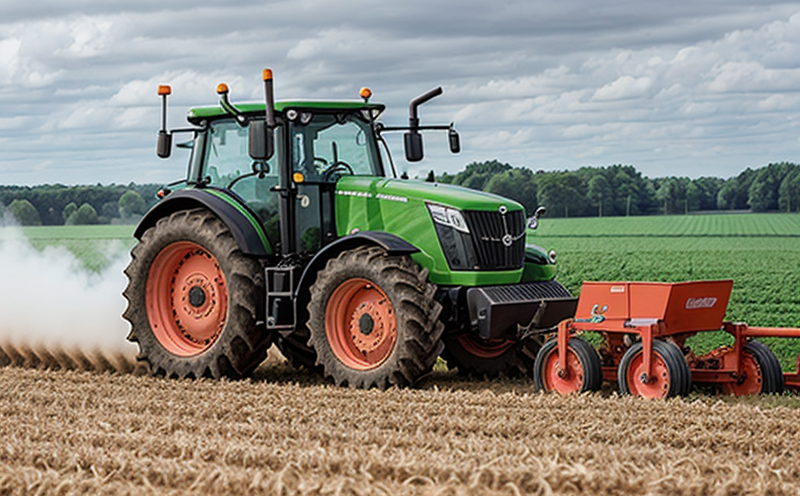Tractor Performance & Power Output Testing
The testing of tractor performance and power output is a critical component in ensuring that agricultural machinery meets both regulatory requirements and operational expectations. This service involves evaluating several key parameters to provide a comprehensive assessment of the tractor's capabilities under various working conditions.
Agricultural tractors are designed for heavy-duty tasks, and their performance directly impacts productivity and efficiency on farms. Testing ensures that these machines operate safely and effectively, minimizing downtime and maximizing output. The primary focus areas include engine power, torque, fuel consumption, emissions, noise levels, and overall operational reliability.
The testing process begins with a thorough inspection of the tractor's specifications and operational requirements. This includes understanding the intended use cases, environmental conditions, and any specific regulatory standards that must be adhered to. Once these factors are established, the machine is subjected to a series of rigorous tests designed to replicate real-world operating scenarios.
A key aspect of this testing is the measurement of power output under different load conditions. This involves connecting the tractor to various agricultural implements and measuring the torque and horsepower generated at each stage. The data collected is then compared against manufacturer specifications and industry standards to ensure compliance with relevant regulations such as ISO 34501:2019.
Fuel consumption testing is another critical element of this service, providing insights into the tractor's efficiency. This involves monitoring fuel usage during various test runs, which helps in identifying any inefficiencies or potential areas for improvement. Emissions testing follows strict protocols to ensure that the tractor meets environmental protection standards like those outlined in ISO 14050:2006.
Noise levels are also closely monitored, as agricultural tractors operate in close proximity to workers and residents. Compliance with noise regulations such as EN 378:2014 is essential for maintaining a safe working environment. Additionally, the testing encompasses mechanical integrity checks, including brake performance, steering accuracy, and overall structural stability.
The results of these tests are meticulously documented and presented in detailed reports that highlight any deviations from expected performance levels. These reports serve as valuable tools for quality managers, compliance officers, R&D engineers, and procurement teams to make informed decisions regarding equipment selection and maintenance schedules.
Why Choose This Test
Choosing tractor performance and power output testing is essential for several reasons. Firstly, it ensures that the machinery meets all relevant regulatory requirements, thereby preventing potential legal issues and penalties. Secondly, it provides valuable data on the machine's operational efficiency, which can lead to cost savings through optimized fuel consumption and reduced maintenance costs.
Moreover, this service enhances safety by identifying any mechanical or operational deficiencies early in the process. This proactive approach helps prevent accidents and ensures that workers are not exposed to hazardous conditions. Additionally, testing supports continuous improvement efforts within R&D teams, allowing for the development of more robust and efficient agricultural equipment.
- Compliance with international standards like ISO 34501:2019
- Identification of operational inefficiencies and potential areas for improvement
- Enhanced safety measures through early defect detection
- Support for continuous improvement in R&D efforts
The comprehensive nature of this testing ensures that agricultural machinery not only meets current standards but also remains competitive in the market. By investing in regular performance and power output tests, organizations can build a reputation for reliability and quality, which is crucial in maintaining customer trust.
Customer Impact and Satisfaction
The impact of tractor performance and power output testing extends beyond mere compliance with regulations; it significantly enhances customer satisfaction by delivering reliable and efficient machinery. By ensuring that the tractors meet strict performance criteria, customers benefit from reduced downtime, lower fuel costs, and improved overall productivity.
A satisfied client is a repeat client, and this service plays a pivotal role in fostering long-term relationships. The detailed reports generated through these tests provide actionable insights for maintenance and operational strategies, further enhancing customer satisfaction. Additionally, the testing process itself serves as a form of quality assurance that reassures clients about the integrity and reliability of their purchases.
- Reduced downtime due to proactive identification of issues
- Lower fuel costs resulting from optimized performance
- Increased productivity through enhanced machinery efficiency
- Actionable insights for maintenance and operational strategies
- Rigorous quality assurance processes that build trust with clients
The satisfaction derived from these benefits translates into higher customer retention rates, positive reviews, and referrals. In today's competitive market, such outcomes are invaluable assets for any agricultural business.
Use Cases and Application Examples
| Use Case | Description | Application Example |
|---|---|---|
| Engine Power Testing | Determining the maximum power output of an engine under various load conditions. | A diesel-powered tractor used in large-scale crop farming undergoes testing to ensure it can handle heavy loads during peak harvest periods. |
| Fuel Consumption Measurement | Monitoring fuel efficiency over extended test runs to identify potential improvements. | An agricultural machinery supplier tests tractors for their fuel consumption rates under different operational scenarios to optimize product offerings. |
| Emissions Testing | Ensuring that emissions fall within regulatory limits to comply with environmental standards. | A manufacturer of agricultural equipment conducts emissions testing on a prototype tractor to meet the stringent requirements set by local authorities. |
| Noise Level Assessment | Assessing noise levels to ensure compliance with safety regulations and enhance working conditions. | A farm implements supplier tests tractors for noise levels during operations in densely populated farming communities. |
| Mechanical Integrity Check | Evaluating the structural integrity of various components to prevent failures. | An independent testing agency inspects a tractor's braking system and steering mechanisms post-production to ensure they meet safety standards. |
These use cases and application examples illustrate the versatility and importance of tractor performance and power output testing across different sectors. By addressing these critical aspects, this service ensures that agricultural machinery is not only reliable but also environmentally friendly and safe for all users.





